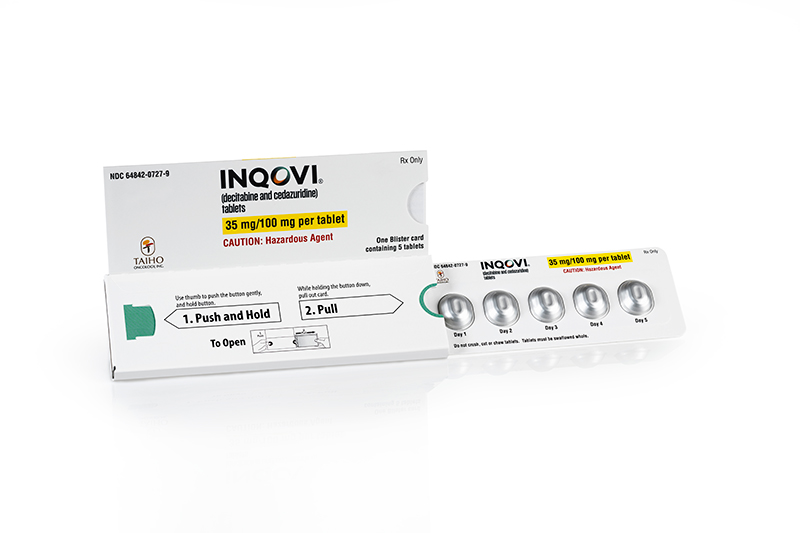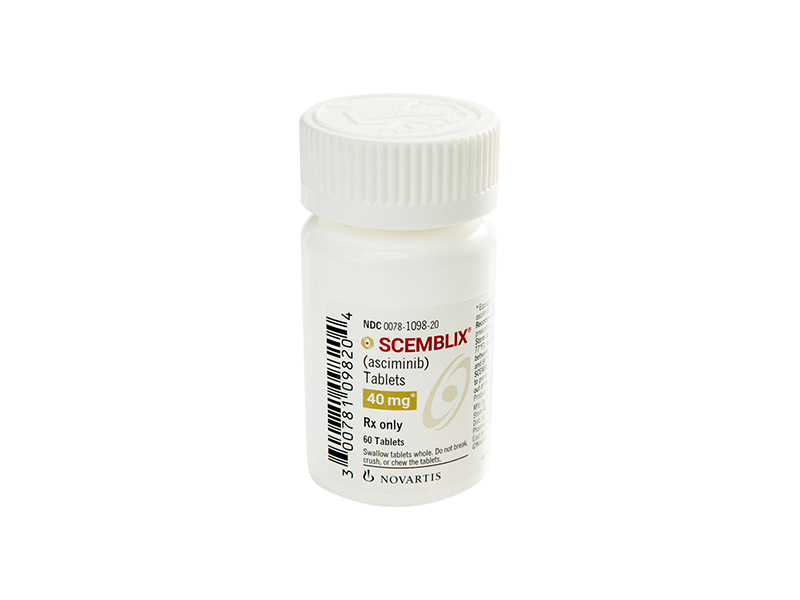Inqovi (decitabine and cedazuridine) vs Scemblix (asciminib)
Inqovi (decitabine and cedazuridine) vs Scemblix (asciminib)
Inqovi (decitabine and cedazuridine) is an oral hypomethylating agent used for the treatment of adults with myelodysplastic syndromes (MDS), including certain types of chronic myelomonocytic leukemia (CMML). Scemblix (asciminib), on the other hand, is a tyrosine kinase inhibitor specifically indicated for the treatment of adult patients with Philadelphia chromosome-positive chronic myeloid leukemia (CML) in chronic phase who have received two or more prior lines of therapy. The choice between Inqovi and Scemblix would depend on the specific type and phase of leukemia a patient has, and it is crucial to consult with a healthcare provider to determine the most appropriate treatment based on the patient's individual medical condition and history.
Difference between Inqovi and Scemblix
| Metric | Inqovi (decitabine and cedazuridine) | Scemblix (asciminib) |
|---|---|---|
| Generic name | Decitabine and cedazuridine | Asciminib |
| Indications | Myelodysplastic Syndromes (MDS), Chronic Myelomonocytic Leukemia (CMML) | Chronic Myeloid Leukemia (CML) |
| Mechanism of action | Hypomethylating agent (decitabine), Cytidine deaminase inhibitor (cedazuridine) | Tyrosine kinase inhibitor |
| Brand names | Inqovi | Scemblix |
| Administrative route | Oral | Oral |
| Side effects | Fatigue, constipation, hemorrhage, myalgia, mucositis, arthralgia, nausea, dyspnea, diarrhea, rash, dizziness, febrile neutropenia, edema, headache, cough, decreased appetite, upper respiratory tract infection, pneumonia, transaminase increased, and blood bilirubin increased | Thrombocytopenia, neutropenia, anemia, musculoskeletal pain, fatigue, nausea, rash, pyrexia, cough, and diarrhea |
| Contraindications | Hypersensitivity to decitabine, cedazuridine, or any component of the formulation | Hypersensitivity to asciminib or any component of the formulation |
| Drug class | Hypomethylating agent, Cytidine deaminase inhibitor | Tyrosine kinase inhibitor |
| Manufacturer | Astellas Pharma US, Inc. | Novartis Pharmaceuticals Corporation |
Efficacy
Inqovi (decitabine and cedazuridine) for Leukemia
Inqovi, a combination of decitabine and cedazuridine, is a medication approved for the treatment of adult patients with myelodysplastic syndromes (MDS), including previously treated and untreated, de novo and secondary MDS with the following French-American-British (FAB) subtypes: refractory anemia, refractory anemia with ringed sideroblasts, refractory anemia with excess blasts, and chronic myelomonocytic leukemia (CMML). MDS are a group of disorders considered to be a form of blood cancer that can lead to leukemia. The efficacy of Inqovi was demonstrated in clinical trials where it was shown to be effective in achieving complete remission or partial remission in a significant number of patients. Additionally, Inqovi has been shown to improve blood cell counts in some patients, which is an important aspect of managing the disease.
The efficacy of Inqovi is particularly notable because it is an oral formulation that combines decitabine with cedazuridine, a cytidine deaminase inhibitor, which helps to increase the bioavailability of decitabine. This allows for a more convenient oral administration as opposed to the traditional intravenous administration of decitabine, potentially improving patient adherence to the treatment regimen and quality of life.
Scemblix (asciminib) for Leukemia
Scemblix, the brand name for asciminib, is a newer medication approved by the FDA for the treatment of chronic myeloid leukemia (CML). Specifically, it is indicated for adult patients with Philadelphia chromosome-positive CML in the chronic phase who have received two or more prior lines of tyrosine kinase inhibitor (TKI) therapy, or for those with the T315I mutation, which is resistant to most other TKIs. Asciminib works by a different mechanism than other TKIs, as it specifically targets the ABL myristoyl pocket of the BCR-ABL protein, which is the driver of CML.
The efficacy of Scemblix was established in clinical trials where it demonstrated a significant ability to achieve major molecular responses in patients who had resistance or intolerance to previous TKI therapies. For patients with the T315I mutation, Scemblix showed a particularly high efficacy rate, which is significant given the limited treatment options for this mutation. The approval of Scemblix provides an important new treatment option for patients with CML who have failed other therapies, offering hope for better disease management and outcomes.
Regulatory Agency Approvals
Inqovi
-
Food and Drug Administration (FDA), USA

-
Health Canada

Scemblix
-
Food and Drug Administration (FDA), USA

Access Inqovi or Scemblix today
If Inqovi or Scemblix are not approved or available in your country (e.g. due to supply issues), you can access them via Everyone.org.
How it works

Make an enquiry
Choose the medicine you want to buy, answer a couple of questions, and upload your prescription to speed things up. We’ll get back to you within 24 hours.


Make an enquiry
Choose the medicine you want to buy, answer a couple of questions, and upload your prescription to speed things up. We’ll get back to you within 24 hours.


Breeze through the paperwork
We'll guide you through the required documents for importing unapproved medicine, ensuring you have all the necessary information.


Get a personalized quote
We’ll prepare a quote for you, including medicine costs and any shipping, administrative, or import fees that may apply.


Receive your medicine
Accept the quote and we’ll handle the rest - sourcing and safely delivering your medicine.

Some text on this page has been automatically generated. Speak to your physician before you start a new treatment or medication.
Let's talk
If you have any questions, call us or send us a message through WhatsApp or email:
Contact us




